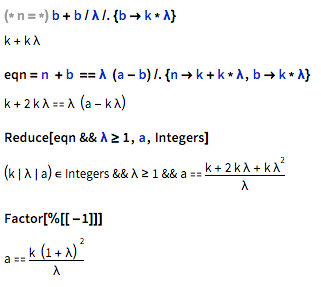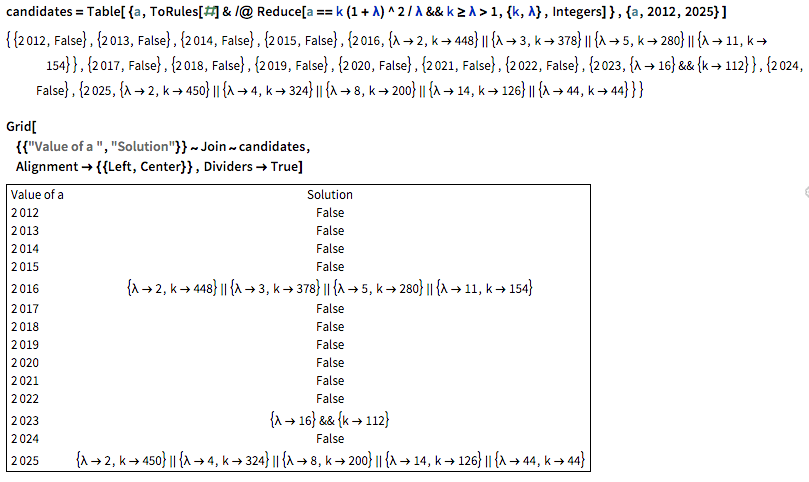You can view the blog on this static page generated by Wolfram Cloud (no beta now!)
Given two positive integers a and b. The two numbers satisfy the following conditions: $a - b$ is a prime number $p$ and $a \times b$ is a perfect square $n^2$ . Find the smallest value of $a$ no less than $2012$.
The formula of those conditions mentioned in the problem is quite straightforward:
a - b == p (* prime *)
a * b == n^2
a >= 2012 && a >= b
Use the deduction to reduce the problem to known solving techniques such as Diophantine equation or Pell equation. To use the first condition in the second relation, I'd better create a certain type of factorization so that $a - b$ can be taken out. This usually useful with prime number $p$ because that $p$ divides $x \times y$ implies $p$ is either a divisor of $x$ or $y$.
Factor[a*b-b^2] (* (a-b)*b *)
Factor[n^2-b^2] (* (n-b)(n+b) *)
We know that the prime $p = a - b$ cannot divide either $a$ or $b$. Otherwise, let $b = k \times p$ and $a = (k+1) \times p$, $a \times b = k \times (k+1) \times p^2$ is never a perfect square unless $k = 0$. Therefore only one term here can be a multiplier of p: either $n - b$ or $n + b$ (aka the product cannot produce $p^2$, $p^3$ and so on). Assume $p$ divides $n - b$, or $n - b = \lambda \times (a-b)$ for $\lambda$ being a positive integer.
Reduce[(a-b)*b==(n+b)*\[Lambda]*(a-b)&&n>0&&a>b>0 && \[Lambda]>0,b,Integers] (* or b = \[Lambda] (n+b) > b ==> False*)
(* False *)
The other statement must be true: $n + b = \lambda (a-b)$. The following code shows that the solution is possible
Simplify/@Reduce[(a-b)*b==(n-b)*\[Lambda]*(a-b)&&a>n>b>1 && \[Lambda]>0,{n},Integers]
Note that n must be an integer and b is an integer, [Lambda] must divide b in order to make b + b/[Lambda] an integer. Therefore $b = k * \lambda$ for some positive integer $k$.
eqn=n + b == \[Lambda] (a-b)/.{n->k+k*\[Lambda],b->k*\[Lambda]}
Reduce[eqn&&\[Lambda]>= 1,a,Integers]
Factor[%[[-1]]]

Because $\lambda$ and $\lambda+1$ are co-prime, $\lambda$ divides k. In case $k == \lambda$, a itself is a perfect square. Lets have a try:
Reduce[(1+\[Lambda])^2 >=2012&&\[Lambda]>0,\[Lambda], Integers]
Therefore,
a/.{a->45^2} (* = 2025 *)
b/.{b->44^2} (* = 1936 *)
Check if the choice pass the prime test and square test:
Block[{a=45^2,b=44^2},{PrimeQ[a-b],IntegerQ[Sqrt[a*b]]}] (* { True, True} *)
So we know the upper bound of the solution is $a = 2025$. Is there any other possibility between $2012$ and $2025$ ? Well we may use the brutal force method here without too much pain:
candidates=Table[{a,ToRules[#]&/@Reduce[a==k(1+\[Lambda])^2/\[Lambda]&&k>= \[Lambda]>1,{k,\[Lambda]},Integers]},{a,2012,2025}]
Grid[{{"Value of a ", "Solution"}}~Join~candidates,Alignment->{{Left,Center}},Dividers->True]

I can reject $a = 2016$ immediately because none of the $b = \lambda*k$ produce an odd number. Otherwise, $a - b$ must be prime and even, which is $2$.
Reduce[a(a-2)==n^2&&a>1,{a,n},Integers] (* a == 2 && n == 0 *)
$a = 2023$ is rejected because the prime test is failed:
PrimeQ[2023-16*112] (* False *)